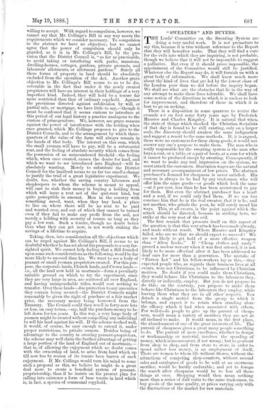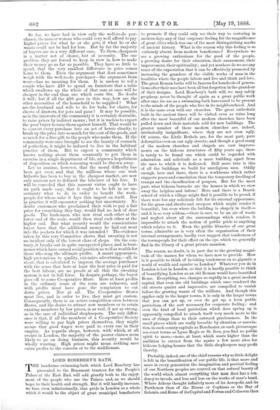" SWEATERS " AND BUYERS.
THE Lords' Committee on the Sweating System are. doing a very useful work. It is not premature to say this, because it is true without reference to the Report that they will hereafter make. That they will find a cure for the evils into which they are inquiring, is not probable, though we believe that it will not be impossible to suggest a palliative. But even if it should prove impossible, the appointment of the Committee would still be justified.. Whatever else the Report may do, it will furnish us with a great body of information. We shall know much more about the kind of lives that are led by the lowest class of the London poor than we did before the inquiry began. We shall see what are the obstacles that lie in the way of any attempt to make these lives tolerable. We shall have some notion of the directions in which it is useless to look for improvement, and therefore of those in which it is best to go on seeking.
There is a disposition in some quarters to revive the crusade s?t on foot some forty years ago by Frederick Maurice and Charles Kingsley. It is natural that when; the state of things which shocked the Christian Socialists of that day is found to be still existing, only on a larger scale, the discovery should awaken the same indignation and suggest a resort to the same methods. If, it is argued, there were no customers for these cheap goods, it would not answer any one's purpose to make them. The man who in responsible for the sweating system is the man who. buys a coat, or a table, or a pair of boots, at a sum for which it cannot be produced except by sweating. Consequently, if we want to make any real impression on the system, we must attack the customers. Starvation wages are the natural and necessary accompaniment of low prices. The abstract purchaser's demand for cheapness is never satisfied. His custom is always to be had by any tradesman who will offer him the same goods—or goods which look the same —at 5 per cent. less than he has been accustomed to pay for them. But even the abstract purchaser has a heart and a soul, if we could only find them. If we can but convince him that he is the real sweater, that it is he, and not another, who grinds the poor, he will surely mend his ways. This, at all events, is the point against which the attack should be directed, because in striking here, we strike at the very root of the evil.
The first remark that presents itself on this aspect of the question is that this very attack has been made already, and made without result. Where Maurice and Kingsley failed, who are we that we should expect to succeed We are not likely to get hold of a more effective weapon than "Alton Locke." If "Cheap clothes and nasty 's proved a useless war-cry when it was first uttered, it is not likely to be more effectual after it has been addressed to deaf ears for more than a generation. The mistake of "Parson Lot" and his fellow-workers lay in this,—they expected people who, as regards their business lives at all events, were not Christians, to be influenced by Christian motives. No doubt if you could make them Christians, they would behave like Christians to the labourers they,. directly or indirectly, employ. But you do not propose to do this ; on the contrary, you propose to make them behave like Christians to the labourers they employ, while leaving them what they are in all other respects. You detach a single motive from the group to which it belongs, and expect it to retain when standing alon& the efficacy which it had when associated with others. For well-to-do people to give up the pursuit of cheap- ness, would mean a variety of sacrifices they are not at all inclined to make. It would mean, in the first place, the abandonment of one of the great interests of life. The pursuit of cheapness gives a great many people something to do. The pursuit of mere excellence, whether in design or workmanship or material, involves the spending of money, which is inconvenient, if not wrong ; but to go about from shop to shop, and from store to store, in order to spend rather less money, is an employment of itself. There are women to whom life without Stores, without the attractions of competing shop-counters, without annual, sales and catalogues of goods to be sold at an enormousg sacrifice, would be hardly endurable ; and yet to forego the search after cheapness would be to lose all these things at once. Shopping would then mean nothing more than a series of dull visits to the same tradesman, to buy goods of the same quality, at prices varying only with the fluctuations of the market for raw materials. So far, we have had in view only the well-to-do pur- chaser, the man or woman who could very well afford to pay higher prices for what he or she gets, if what he or she wants could not be had for less. But by far the majority of buyers are in a very different case. To them, cheapness is a matter not of choice, but of necessity. The one problem they are forced to keep in view is, how to make their money go as far as possible. They have so little to spend, that the very smallest difference in price comes home to them. Even the argument that does sometimes weigh with the well-to-do purchaser—the argument from wear—has no meaning for them. It is useless to tell a couple who have £10 to spend on furniture that a table which swallows up the whole of that sum at once will be cheaper in the end than one which costs 30s. No doubt it will ; but if all the £10 goes in this way, how are the other necessities of the household to be supplied ? What are the husband and wife to do for beds, for chairs, for chests of drawers, for pots and pans ? It may be possible, as in the interests of the community it is certainly desirable, to raise prices by indirect means ; but it is useless to expect the poor buyer to raise them against himself. That would be to convert every purchase into an act of heroic charity, to break up the price into so much for the cost of the goods, and so much for a free gift to the people who make them. If the community were once brought to see the beauty of counsels of perfection, it might be induced to live in the habitual practice of them. But to expect a community which knows nothing about them constantly to put them in exercise in a single department of life, argues a hopefulness of disposition on which reasoning would be thrown away. Let us assume, however, that the moral difficulty has been got over, and that the millions whose one wish hitherto has been to buy in the cheapest market, are now only anxious not to defraud the labourer of his hire. It will be conceded that this nascent virtue ought to have its path made easy, that it ought to be left in no un- certainty what to do in order to benefit the work- people for whose sake it lays this impost on itself. But in practice it will encounter nothing but uncertainty. No doubt customers who proclaimed their wish to pay a fair price for everything they buy, would find no lack of dear goods. The tradesmen who now rival each other at the lower end of the scale, would then rival each other at the higher end. But what security would the conscientious buyer have that the additional money he laid out went into the pockets for which it was intended ? The evidence taken by this very Committee shows that sweating is not an incident only of the lowest class of shops. On the con- trary, it breaks out in quite unexpected places, and in busi- nesses which have earned social position as well as wealth for those who reap the ultimate profits. A smart appearance, high pretensions to quality, extensive advertising,—all, in short, that is calculated to impress the average purchaser with the sense that here at least the best price is paid for the best labour, are no proofs at all that the sweating system is not in full force. In despair, perhaps, the buyer goes off to some Co-operative Store. Here at least profits in the ordinary sense of the term are unknown, and with profits must have gone the temptation to cut down prices. Not at all. The Co-operative Stores must live, and in order to live, they must get custom. Consequently, there is an active competition even between Stores, and the desire to attract new members or to retain existing members by low prices, is as real, if not as strong, as in the case of individual shopkeepers. The only differ- ence is that, if all the members of a Co-operative Society were willing to pay high prices themselves, they might secure that good wages were paid to every one in their employ. As regards shops, however, with which, at all events in London, the majority of the poorer classes seem likely to go on doing business, this security would be wholly wanting. High prices might mean nothing save extra profits to the concern or to the middleman.



































 Previous page
Previous page